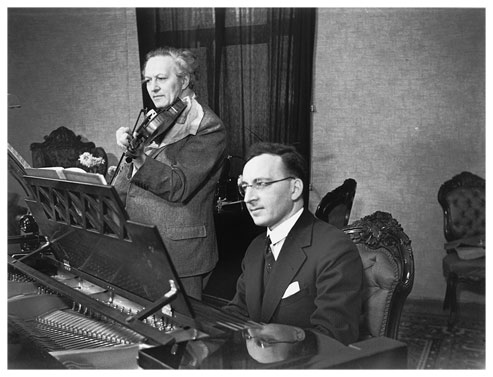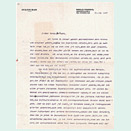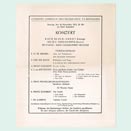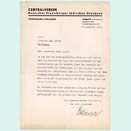Thursday
21 December 1933
Kurt Singer and Joseph Rosenstock performing at a benefit concert
"A concert was held for the Hanukkah fund established by the women‘s association of the Independent Order of B‘nai B‘rith Lodges. A number of top-notch artists selflessly agreed to perform, first and foremost the generalissimi of the Cultural League of German Jews, Dr. Kurt Singer (violin) and Joseph Rosenstock (piano), who played a Mozart violin sonata." Thus began the short review of the benefit concert that appeared in the CV-Zeitung on 21 December 1933. As the review notes, all the proceeds went to the B‘nai B‘rith‘s women‘s organization. The newspaper also published the photograph taken by Herbert Sonnenfeld of the two musicians that is shown here.
Like Kurt Singer, Joseph Rosenstock lost his prominent position in the German music world in April 1933 when he was dismissed as general music director of the Mannheim National Theater, where he had worked with great success for three years. Born in Krakow in 1895, he had previously held posts with the Vienna Philharmonic Choir, the Wiesbaden State Opera and the Metropolitan Opera in New York. After leaving Mannheim, he was recruited by Kurt Singer as general music director for the Cultural League of German Jews, a position that included the role of musical director for the opera company the league was planning to form.
Immediately after the Cultural League was founded, Singer and Rosenstock ran ads in the CV-Zeitung to recruit artists for the opera. What they needed most of all were "opera soloists, male and female choir members, as well as orchestral musicians, particularly wind players." It was not long before they had assembled an operatic choir and a forty-two piece orchestra and hired several top singers. The Cultural League‘s first major production was Mozart‘s Marriage of Figaro, which premiered on 14 November 1933. "A distinguished evening for the Cultural League and an honestly earned success," wrote the critic Ludwig Misch in the Jüdische Rundschau.
There followed ten additional opera and operetta productions and numerous concerts under Rosenstock‘s direction. In1936 Rosenstock immigrated to Japan, where he served as conductor of Tokyo‘s New Symphony Orchestra. After the Second World War, he moved to the United States, where he worked as director of the New York City Opera for four years before returning to Japan for several years in 1955. In 1961 he was once again hired by the Metropolitan Opera and remained with the company for eight years. Joseph Rosenstock died at an advanced age in New York in 1985.
The fates of the other performers at the benefit concert in December 1933 ranged from rescue to calamity. Whereas baritone and cantor Fritz Lechner and the actress Ilse Intrator managed to immigrate to the United States, three of the musicians fell victim to the Nazi death machine: pianist Erna Klein was killed in Kalevi-Liiva in Estonia in September 1942, singer Frieda Weber-Fleßburg was murdered in Auschwitz in January 1943 and Cultural League director Kurt Singer died of exhaustion in the Theresienstadt ghetto in February 1944.
Aubrey Pomerance



